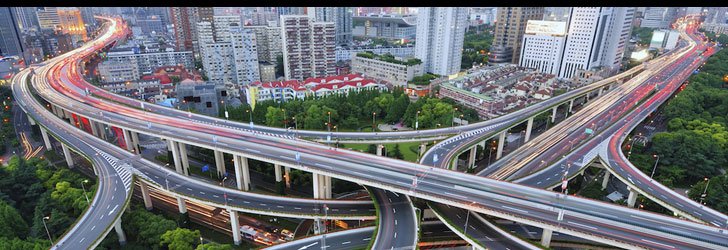Is Property Price Affect By Modern Transit and Highways? LOCATION LOCATION LOCATION is the most important thing in choosing your home. Because it is the one thing that you can’t change. Do yourself a favor and remember that. You can redecorate, send your kids to different schools, etc. But you are stuck with the view and surrounds of the locale that you select. BEEP! BEEP! Do you hear that everyday? Whether you are hurrying along your daily commute, or whether you live adjacent to a busy highway. The stress and noise of modern transit seem unavoidable.
Check Property Price Affect By Modern Transit and Highways ?

Highways Can Have a Positive Impact on Property Price
As mentioned above, not all properties are negatively impacted by highways. In fact, there are several situations, where highways can actually increase property price value. This is particularly true for commercial areas.
Commercial properties price, that have limited access can benefit from the addition of a highway. More people passing through, equals more business. Of course, this increased exposure increases the profits of the business and the property price.
You do, however, want to make sure, when the highway is put in that your business can be easily and safely accessed. You may want to talk with city planners to discuss, whether your business needs a traffic light, as safety and available parking can make the difference between a person dropping in, or driving on by.
As you can see, there are numerous ups and downs to having a property near a major highway. There are so many factors to consider, and whether your home value goes up or down truly depends on accessibility, noise, location, safety and emissions etc…
When purchasing a new home, it is important to take into consideration the transit ways and highways around the property. If there is plans for a major highway, it could cause some noise issues, causing your property price to decrease.
On the other hand if there are plans for a new transit station that makes the big-city commute more accessible. You could watch your property price soar! Are you living near a busy highway? If so, do you love it or hate it? Check : Factors that Determine the Reduction in Property Price Caused by Traffic Noise
Rail Transit and Property Price
The nuisance of living next to a station can be overcome through careful planning to shield noise and visual pollution from adjoining land. People who have visited the CST area can attest that Cal train is much louder than either BART or light rail trains.
The accessibility that the rail line offers affects the resulting change in property price. For example, a peak-period only commuter rail line may make single-family homes, whose residents may have traditional jobs and own a car they can use on evenings and weekends, more valuable but have little effect on multi-family housing that could have a large percentage of its residents be transit dependent.
Similarly, traditional business day employers may pay a premium to be located near commuter rail stations, whereas retail and other employers who offer non-traditional hours may not.
Overall, the presence of rail transit has in general been found to have a significant but slight beneficial effect on both residential and commercial property price, with the exception of residential parcels located directly next to the station, which in some, but not all, cases has experienced a slight decrease in property price due to the nuisance factor.
The nuisance factor has been found to be a problem mainly in quiet, suburban areas; the inherently louder nature of higher density areas masks the impacts, if any, of a rail line.
- Did you know how to sell property most rewarding ways online? Here are some creative tips for sell property with good appreciation.
Highways Create Land-Locked Issues
Highways can also create what is known as a land-locked situation. This situation can also decrease the price of a particular property. This is mostly due to its lack of appeal for buyers, when they have to find an alternate route into the property.
A land-locked property occurs, when the Department of Transportation (DOT) turns a ‘back road’ into a highway. Most often, this happens in rural areas where DOT decides to put a highway through a current farm or farm road. After all, expansion is the name of the game, right? And a new highway usually means the future encroachment of big cities into the suburbs.
When DOT does this, individuals may not be able to access their properties as they once had. They may have to go through neighbors’ properties or find new routes.
When a property cannot be easily accessed by the owner, it decreases the property price-nobody wants to invest money into a property they cannot get to without a hassle. On the flip side, access to a new highway may drastically increase the value of surrounding homes. It’s all about perspective.
Increased Traffic, Decreased Safety
While new highways are great for commuters, they are not so great for those whose homes are impacted by traffic and noise pollution.
Obviously, a highway brings more traffic to the area. While this is a positive impact from a business perspective, it can be a negative impact in a residential community. Areas that have been looked at as being good family neighborhoods may not hold this appeal once a highway is put in.
Highways bring a lot of vehicles driving at various speeds. Homeowners, particularly those with children, will find this unappealing when purchasing a home. If a home is already built in a area and then a highway comes in, it becomes less appealing, for safety reasons.
Parents want to know that their kids can play in the yard without having to worry about a 6-car pile up, or drunk drivers, or vehicles traveling at high rates of speed. Not to mention, the new accessibility of your home to devious people. All of these factors will make home values decline and make it hard to sell
Try to protect your assets by investigating future city plans before buying. If it is already too late and the highway has been constructed, then be creative with exterior home designs such as fences, gated courtyards, water falls to drown out noise, security and green walls that beautify and act as sound barriers.
The Closer You Are The Better?
As was mentioned above, noise from a busy highway has a seriously negative impact on property price value. This would seem especially true for individuals whose property is closer to the highway.
However, the opposite may be the case, statistical models from one transit rail study showed that with every meter a house was located to a particular railway station, property price went up by $2.29. While this doesn’t seem like much, the study showed that houses immediately adjacent to the stations sold for 38% more.
So is closer always better? Is there some truth to the classic economic theory, When a highway is initially built, large parcels of land that previously had poor accessibility, or none at all – are suddenly undervalued?
Yes, it seems intuitive that if you go from limited transit access to immediate proximity of modern transit, then your home value will increase.
However, let’s say a highway was not present during the time your home was purchased or built, wouldn’t the introduction of a busy highway decrease your property price? Well, the answer is- it depends. This study on property price and highway expansions shows that home price depend on numerous factors such as proximity, noise, emissions, vibrations etc… Simply put, it’s complicated.
Public Overview About Property Price With Respect To Urban Planning
Q. I have found the perfect house at a bargain price, but it backs on a noisy road. Worse, an above-ground light rail system is being installed in the median strip, and I have no idea, how that will impact noise levels in the future. Although I don’t mind noise too much, I am worried about resale values. Should I just keep looking?
A. Possibly. Problems with a property price that you can’t control, particularly those involving location, should always give you pause. And even though somewhere in the universe, other buyers exist who, like you, don’t mind road noise, most buyers do.
So if you buy this house, realize that you will always be at a disadvantage when you try to sell. It will take longer to find those buyers who don’t care about traffic’s noise, fumes and grime, and you will undoubtedly have to sell at a discountable property price to make up for the drawbacks.
According to Hofstra University’s Department of Global Studies and Geography, impact analyses show that road noise causes property price to fall 8% to 10%. But the figure could be less or more, depending on the road’s use and speed limit; whether or not traffic sound barriers or walls exist or are planned; and how much vegetation exists.
Superhighways are more noxious, than secondary roads not just because they are more heavily traveled but because faster cars are noisier. Concrete barriers are ugly, even when they are planted with ivy, and block light, but are fairly effective in blocking noise.
Greenery is prettier, but its ability to reduce noise is limited.
According to the National Highway Administration, only tall plantings that are too dense to be seen through offer any protection. And to reduce road noise just by half, it must be 200 feet wide-a much wider strip than exists along most road landscape buffers.
Before you make an offer, you should visit the property during rush hour and off times to gauge just how loud the traffic is. However, keep in mind that it can only get more bothersome once the light rail system is completed and trains are added to the mix. Also, check the house’s sales history, see how property price has held up compared with comparable ones that don’t back to a road.
Know More About Buying Property Guide,
- Property Buying Checklist : House Buying Guide for First Time Buyers
- Buying Safe for Home with Consideration of this 9 Things in Mind
- How to Sell your Property with Best Rewarding Way
- How To Avoid Mistakes And Home Renovating Tips
- Affordable Housing – Why People can’t buy own Home in Urban Areas ???
- Characteristics of a Modular Homes Planning with Pros and Cons
- How to link aadhaar card with driving licence?
With this in mind, it will most certainly affect the value and sale of the home.
One of the considerations we point our for our customers is the importance of considering the resale value of any home before purchasing it. With desirability weighing in heavily, road noise, dust and dirt, and its affect on general maintenance will be a major distraction.
Of course, if the home is only a short distance from the planned light rail station, the added convenience may well make it more appealing to commuters when you resell. That may mitigate some of the loss in value from noise, particularly in traffic-clogged.
We would conservatively estimate that the “road noise” issue would be a negative factor for about half of the future buyers and property price.







Leave a Comment
You must be logged in to post a comment.